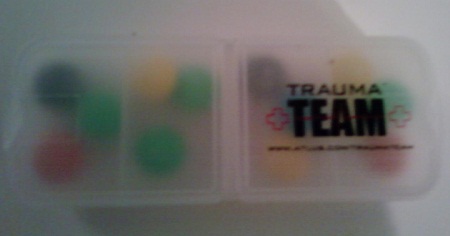Prologue: I promise I’m going to write some blog posts that aren’t #BoRT entries someday. I’m moving across states this week, nine months after last time I did it. Time is…well, it’s difficult to come by.
The theme of this month’s Blogs of the Round Table is “Origins”. Per #BoRT curator Alan Williamson: “What are your earliest memories of gaming? How do you think your childhood (or childish adulthood) experiences of gaming have influenced your life, if at all? Are there any game origin stories that reflect your own?”
Here goes nothing:
* * *
I didn’t “get” my first console. It was just, you know, there. I don’t even remember how I came to start playing it, just that I played it. I played Pong on it with a paddle, I played Combat on it with a joystick. It was an ugly thing, a giant brown box with conspicuous ports, buttons, and switches. It was my older brothers’ machine, and for some reason, when they moved out, they left it with my folks.
 It was an Atari 2600. It didn’t change me or anything, I just can’t imagine my childhood without it.
It was an Atari 2600. It didn’t change me or anything, I just can’t imagine my childhood without it.
I remember playing Pac-Man on that machine. I loved Pac-Man on that machine. I’m fully aware, 30 years later, that the Atari 2600 port of Pac-Man is largely derided as perhaps the worst version of a classic game, but it didn’t matter. It’s amazing what can come off as brilliant when you don’t know that anything better exists. All I knew at that point was that it worked part of my brain that no other entertainment could. It also offered the first hints of my obsessive-compulsive tendencies when it came to video games; even when I was five years old, my Pac-Man strategy was to get all the dots first, saving all the power pellets for the end.
I remember playing Football on that machine. Honestly, I didn’t know what the hell was going on.
I remember playing E.T. on that machine. I may have played more E.T. than any other Atari game save for Pitfall II, certainly more than any other game that I “inherited” from my brothers. It was a fascinating and alien thing. It was aggressively strange, punishing, and difficult, and I wanted so badly to understand it. I got pretty good at it, if I’m being honest.
I remember playing Yars’ Revenge, Venture, and Super Breakout. I remember playing Pitfall, and Kaboom, and River Raid. I remember playing some odd Sesame Street thing that involved an exclusive number-pad peripheral thing. And I remember playing them over, and over, and over again. Somehow, my parents let me stick with these games, they let me treat them like any other toy, and not like the devil in the TV.
Heck, I should probably thank them for that.
The first machine I was alive for when it was introduced into the house was an IBM PCJr. As if to try and convince me that this machine was a necessary component of our household, my dad showed me Jumpman on the first day that computer was in the house.
Do you remember Jumpman? Think a sub-8-bit version of N+ and you’re probably not too far off.
My god. I just remembered that computer was in the kitchen. THE KITCHEN. Why was it in the kitchen?
As much as the 2600 showed me what video games could be and do, that PCJr showed me what they were made of. I bought books of BASIC programs that I one-fingered into files, LOADed, and RUNned. Every so often, a game I bought in the store would error out, and I’d get a glimpse of the source code, a stray GOSUB or a division by zero error. It was proof that these things were written, line by line, by actual honest to goodness humans. I admired these humans, even at six years old. I wanted to meet them, and I wanted to be them. I wanted to know what it was like to make something as open-ended and gleefully difficult as King’s Quest (a PCJr exclusive when it was first released!) and as utterly mysterious and far-reaching as In Search of the Most Amazing Thing.
Where the 2600 represented the future of toys, the PCJr represented endless possibility, a world in which creation and consumption could coexist and intermingle, a world in which I could, when I learned enough, change my games to suit my needs and interests.
Could I have articulated all that then? Hell no. Still, I think it was there in an abstract sense. Just as a child can sense tension even when all the grownups in the room are still plastering smiles on their faces, a child also knows when the future is knocking on the door.
My brothers, and then my father, brought the future into our house. I didn’t even have to ask. It’s no wonder I can’t just “play” games. I have to understand them, too.



















